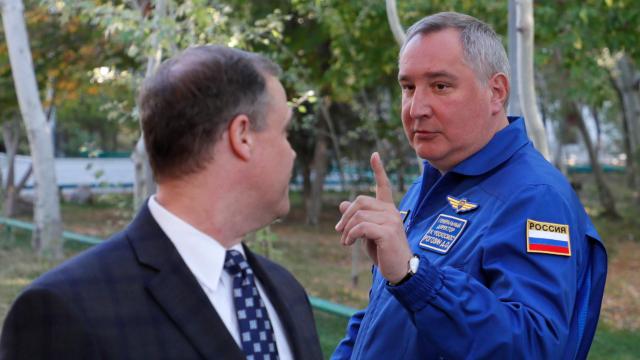This week, a team of researchers announced they have discovered traces of phosphine in the atmosphere of Venus — a gas produced almost exclusively on Earth by anaerobic microorganisms, but the presence of which on Venus scientists currently don’t understand.
Dmitry Rogozin, the head of Russia’s state-run aeronautics corporation Roscosmos, responded to this discovery by asserting two things: Venus is a nightmare world that belongs to Russia, and he intends to up the number of missions his agency will send there.
“Our country was the first and only one to successfully land on Venus,” Rogozin told attendees at the 2020 HeliRussia exhibition, according to Russia’s state-run TASS news agency. “The [Russian] spacecraft gathered information about the planet — it is like hell over there.”
“We believe that Venus is a Russian planet,” Rogozin added.
First thing’s first: Rogozin is somewhat notorious for trolling. So it’s almost certain that he wasn’t declaring an actual territorial claim to the entire planet. Rogozin may have been lobbing knowing jab at NASA, which recently began soliciting bids for the first commercial off-world purchase of Moon rocks. NASA has long rejected the view that space is a global commons, instead viewing off-world resources as up for grabs by anyone with the capability to get them. This policy has prompted accusations of space colonialism from Roscosmos officials.
It is also, of course, possible that Rogozin was simply joking that the inhospitable climate in parts of Russia and the nightmarish conditions on Venus’s surface — temperatures of 880 degrees Fahrenheit, clouds of sulfuric acid, and atmospheric pressure 90 times that of Earth, to name some — bear more than a few things in common.
Russia was indeed the first country to have successfully landed on the Venusian surface with its Soviet-era Venera missions, and Roscosmos can credibly boast about the hardiness of the Russian craft that made it there: Venera-13 survived an astonishing 127 minutes, while one of NASA’s four Pioneer Venus Multiprobe’s managed to land and transmit just for over an hour in 1978. (Roscosmos is continuing to discuss a collaboration with NASA on the proposed Venera-D mission, which would send another lander to Venus in 2026 or 2031.)
According to the AFP, Rogozin commented last month that “I believe that Venus is more interesting than Mars,” adding “If we don’t study what is happening on Venus then we won’t understand how to prevent a similar scenario from happening on our planet.”
Rogozin also stated Roscosmos was considering its own additional mission(s) to Venus with the intent of returning materials samples from its surface, with TASS reporting that Scientific Director of the Russian Space Research Institute Lev Zeleny also said in May that the agency plans to send at least three research vehicles. NASA is also considering doing so, having neglected Venus research for decades as it focused on planets and moons with water. (Any oceans Venus may have had have long since disappeared due to some kind of apocalyptic event.)
Both agencies have historically struggled with funding. NASA has two plans for Venusian spacecraft called DAVINCI+ and VERITAS, but they’re competing for funding with missions to Neptune’s moon Triton and Jupiter’s moon Io. The Russian government has slashed funding for Roscosmos repeatedly in recent years, even as it’s facing pressure from competitors like SpaceX who offer cheaper, reusable rockets. Rogozin has offered a lot of bluster about Roscosmos’ capabilities despite the cuts, but this week he admitted that insufficient funding was taking a toll.
“I don’t quite understand how to work in these conditions,” Rogozin said. “We are seeing that leading foreign space agencies are increasing their budgets.” Going to hell just isn’t as easy as it used to be.
